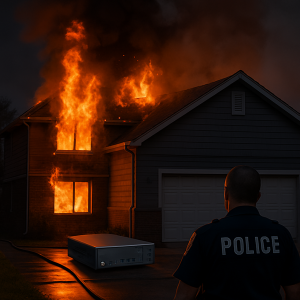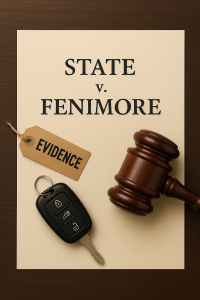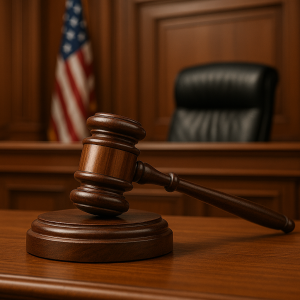 The New Jersey Supreme Court’s December 4, 2025 decision in State v. Caneiro is a big reminder that “exigent circumstances” is not a slogan courts apply in hindsight, but an objective, fact-sensitive test grounded in what officers reasonably knew in the moment. Here, the Court focused on whether the exigent-circumstances exception applied during an active house fire, where officers believed that getting a warrant was impracticable and immediate action was needed to prevent the destruction of evidence located in an attached garage.
The New Jersey Supreme Court’s December 4, 2025 decision in State v. Caneiro is a big reminder that “exigent circumstances” is not a slogan courts apply in hindsight, but an objective, fact-sensitive test grounded in what officers reasonably knew in the moment. Here, the Court focused on whether the exigent-circumstances exception applied during an active house fire, where officers believed that getting a warrant was impracticable and immediate action was needed to prevent the destruction of evidence located in an attached garage.
The case arises from a 5:02 a.m. house fire at Paul Caneiro’s home in November 2018. While firefighters were still battling an active blaze in the main structure, police entered the attached garage and seized a security system DVR without a warrant, about forty minutes after first arrival and roughly thirty minutes after the small garage fire had been extinguished. The State alleges the DVR captured Caneiro disconnecting the security cameras before starting the fire. Later, the defendant gave valid consent to search the DVR’s contents. The trial court suppressed the DVR, stressing that the garage fire had been out for nearly thirty minutes and characterizing the officers’ retrieval as calm and deliberate. The Appellate Division affirmed.
The Supreme Court unanimously reversed, holding that under the totality of circumstances, the warrantless seizure was objectively reasonable because time was of the essence and securing a warrant was impracticable while the fire remained active and suppression efforts threatened the integrity of sensitive digital evidence. The Court looked at the whole scene, not just the garage in isolation, and rejected the idea that officers’ calm demeanor meant there was no real emergency. The question, it emphasized, is not how things look in a quiet courtroom years later, but what a reasonable officer on that chaotic scene could conclude at the time.
 Hudson County Criminal Lawyer Blog
Hudson County Criminal Lawyer Blog






 In State v. Juan C. Hernandez-Peralta (decided July 22, 2025), the New Jersey Supreme Court answered a practical question that comes up all the time in criminal practice: how far does a defense lawyer have to go to investigate a client’s immigration status? The Court held that, on the facts of this case, sentencing counsel was not constitutionally ineffective for asking, “Are you a U.S. citizen?”, getting a clear “yes”, and relying on that answer, even though the client later turned out to be a noncitizen who faced deportation.
In State v. Juan C. Hernandez-Peralta (decided July 22, 2025), the New Jersey Supreme Court answered a practical question that comes up all the time in criminal practice: how far does a defense lawyer have to go to investigate a client’s immigration status? The Court held that, on the facts of this case, sentencing counsel was not constitutionally ineffective for asking, “Are you a U.S. citizen?”, getting a clear “yes”, and relying on that answer, even though the client later turned out to be a noncitizen who faced deportation. The New Jersey Supreme Court has continued to reinforce the strength of our State Constitution’s warrant protections in its recent decision, State v. Fenimore. The Court unanimously held that the automobile exception does not permit police to conduct a warrantless search of a vehicle once law enforcement has full control over the car, its occupants, and the surrounding environment. In Fenimore, the defendant had been arrested for DWI inside a State Police barracks, the passenger had been removed, officers had possession of the keys, and the vehicle was required to be held for a mandatory twelve-hour impound period under John’s Law. Despite these circumstances, where mobility, safety concerns, and the risk of evidence destruction were completely neutralized, the State Police searched the car in the station parking lot without obtaining a warrant.
The New Jersey Supreme Court has continued to reinforce the strength of our State Constitution’s warrant protections in its recent decision, State v. Fenimore. The Court unanimously held that the automobile exception does not permit police to conduct a warrantless search of a vehicle once law enforcement has full control over the car, its occupants, and the surrounding environment. In Fenimore, the defendant had been arrested for DWI inside a State Police barracks, the passenger had been removed, officers had possession of the keys, and the vehicle was required to be held for a mandatory twelve-hour impound period under John’s Law. Despite these circumstances, where mobility, safety concerns, and the risk of evidence destruction were completely neutralized, the State Police searched the car in the station parking lot without obtaining a warrant. The New Jersey Supreme Court recently issued a major ruling that reshapes how courts and prosecutors must apply the state’s strict Graves Act sentencing rules for gun offenses. In State v. Zaire J. Cromedy (decided August 5, 2025), the Court unanimously held that a conviction under N.J.S.A. 2C:39-5(j), which makes it a first-degree crime for someone with a prior No Early Release Act (NERA) conviction to unlawfully possess a weapon, is not automatically subject to the Graves Act’s mandatory parole-ineligibility period.
The New Jersey Supreme Court recently issued a major ruling that reshapes how courts and prosecutors must apply the state’s strict Graves Act sentencing rules for gun offenses. In State v. Zaire J. Cromedy (decided August 5, 2025), the Court unanimously held that a conviction under N.J.S.A. 2C:39-5(j), which makes it a first-degree crime for someone with a prior No Early Release Act (NERA) conviction to unlawfully possess a weapon, is not automatically subject to the Graves Act’s mandatory parole-ineligibility period. The Supreme Court of New Jersey’s decision in State v. Isaiah J. Knight offers a nuanced examination of the limits of reciprocal discovery in criminal cases, particularly focusing on the circumstances surrounding an affidavit recanting a witness’s previous identification of the defendant as the perpetrator of a crime. The facts of this case play a crucial role in understanding the Court’s rationale and its implications for criminal defense.
The Supreme Court of New Jersey’s decision in State v. Isaiah J. Knight offers a nuanced examination of the limits of reciprocal discovery in criminal cases, particularly focusing on the circumstances surrounding an affidavit recanting a witness’s previous identification of the defendant as the perpetrator of a crime. The facts of this case play a crucial role in understanding the Court’s rationale and its implications for criminal defense.
 In a landmark decision, the New Jersey Supreme Court provided critical insights into the state’s witness tampering statute through the case of State v. William Hill. This case scrutinized the boundaries of lawful communication and witness intimidation, posing significant implications for criminal defense strategies.
In a landmark decision, the New Jersey Supreme Court provided critical insights into the state’s witness tampering statute through the case of State v. William Hill. This case scrutinized the boundaries of lawful communication and witness intimidation, posing significant implications for criminal defense strategies. The Supreme Court of New Jersey’s decision in the case of State v. Curtis L. Gartrell presents a significant analysis of property rights and the Fourth Amendment’s protections against unreasonable searches and seizures. In this case, the court examined the concept of abandonment in the context of a police chase, where the defendant fled and left behind a suitcase containing illegal substances. By abandoning the suitcase, Gartrell relinquished any privacy interest he had in the item, thereby negating his ability to challenge the police’s warrantless search of the suitcase.
The Supreme Court of New Jersey’s decision in the case of State v. Curtis L. Gartrell presents a significant analysis of property rights and the Fourth Amendment’s protections against unreasonable searches and seizures. In this case, the court examined the concept of abandonment in the context of a police chase, where the defendant fled and left behind a suitcase containing illegal substances. By abandoning the suitcase, Gartrell relinquished any privacy interest he had in the item, thereby negating his ability to challenge the police’s warrantless search of the suitcase.
 In a landmark decision, the New Jersey Supreme Court weighed in on a crucial issue of first impression: Must a criminal defendant be provided in-person interpreting services during a jury trial, or will video remote interpreting (VRI) suffice? The case of State v. Juracan-Juracan dives into this question, addressing a major point of contention within the legal community—especially given the significant adjustments courts have had to make in response to the COVID-19 pandemic.
In a landmark decision, the New Jersey Supreme Court weighed in on a crucial issue of first impression: Must a criminal defendant be provided in-person interpreting services during a jury trial, or will video remote interpreting (VRI) suffice? The case of State v. Juracan-Juracan dives into this question, addressing a major point of contention within the legal community—especially given the significant adjustments courts have had to make in response to the COVID-19 pandemic.